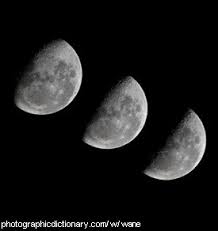wane
英 [weɪn]
美 [weɪn]
- vi. 衰落;变小;亏缺;退潮;消逝
- n. 衰退;月亏;衰退期;缺损
- n. (Wane)人名;(英)韦恩;(阿拉伯)瓦尼;(几、马里、塞内)瓦内
使用频率:

记忆方法
1. want, wanton => wane.
2. This was derived from the base *wan- 'lacking', which also produced English want.
3. The related but now defunct English adjective wane 'lacking' is represented in the first syllable of wanton.
4. 谐音“萎了、微了”----萎缩了、微小了、微弱了。
2. This was derived from the base *wan- 'lacking', which also produced English want.
3. The related but now defunct English adjective wane 'lacking' is represented in the first syllable of wanton.
4. 谐音“萎了、微了”----萎缩了、微小了、微弱了。
中文词源
wane 衰落
来自Proto-Germanic*wano,缺乏,空无,词源同want,waste。引申词义衰弱。
英语词源
- wane
-
wane: [OE] Wane and Norwegian vana ‘spoil, waste’ are the only survivors of a family of Germanic verbs that goes back to a prehistoric *wanōjan. This was derived from the base *wan- ‘lacking’, which also produced English want. The related but now defunct English adjective wane ‘lacking’ is represented in the first syllable of wanton.
=> want, wanton - wane (v.)
- Old English wanian "make or become smaller gradually, diminish, decline, fade," from Proto-Germanic *wanen (cognates: Old Saxon wanon, Old Norse vana, Old Frisian wania, Middle Dutch waenen, Old High German wanon "to wane, to grow less"), from *wano- "lacking," from PIE *we-no-, from root *eue- "to leave, abandon, give out" (see vain). Related: Waned; waning; wanes.
权威例句
- 1. The moon is on the wane.
- 月亮渐亏.
- 2. When did the empire begin to wane?
- 那个帝国何时开始衰落的?
- 3. Her enthusiasm for him was beginning to wane.
- 她对他的热情在开始减退.
- 4. He was nominally Deputy Prime Minister, certainly, but his influence was clearly on the wane.
- 当然,他名义上是副首相,但是显然他的影响力正在下降。
- 5. In 1982, with his career prospects on the wane, he sold a script for £5,000.
- 1982年,他的事业走下坡路时,以5,000英镑的价钱卖了个剧本。
